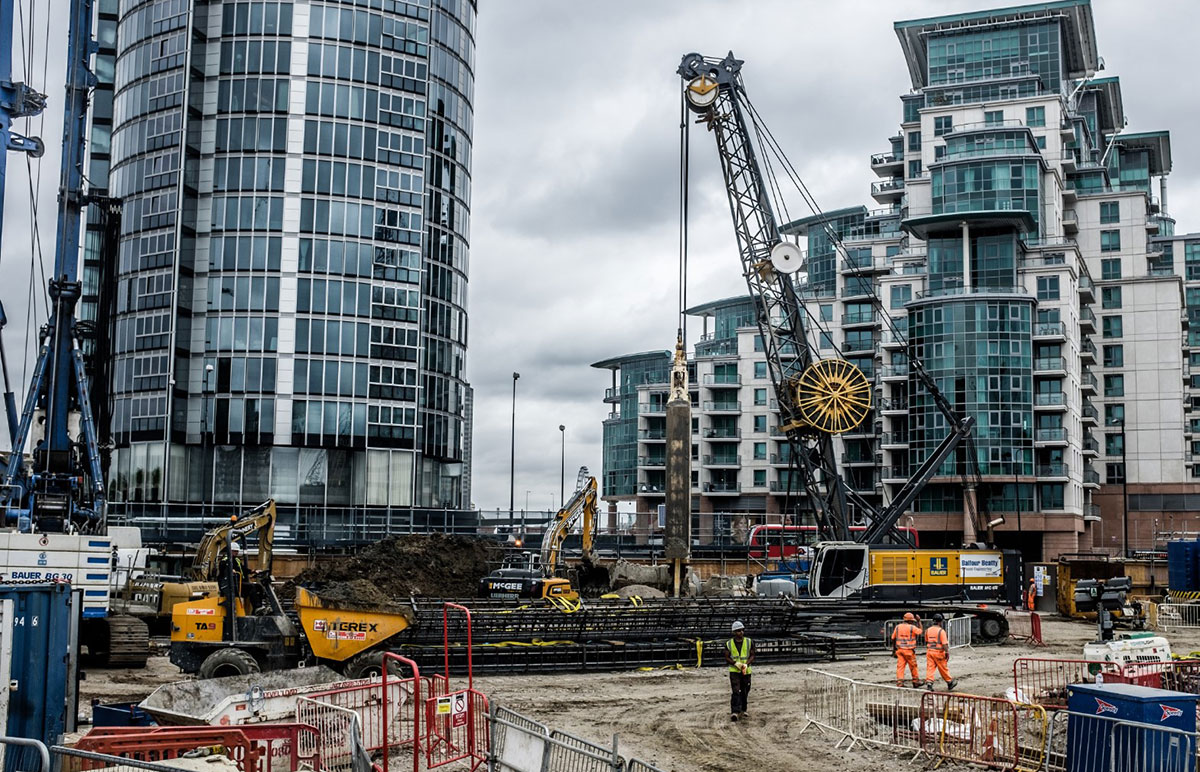Indicators on Geotheta You Should Know
Indicators on Geotheta You Should Know
Blog Article
See This Report on Geotheta
Table of Contents3 Easy Facts About Geotheta ShownThe Greatest Guide To GeothetaGet This Report about GeothetaAll about GeothetaGet This Report on Geotheta

They carry out website investigations, accumulate samples, carry out research laboratory tests, and assess data to evaluate the suitability of the ground for construction tasks - Engineer of Record. Based upon their findings, geotechnical designers supply recommendations for structure design, slope security, preserving frameworks, and reduction of geotechnical threats. They team up with various other specialists, such as engineers, architectural designers, and building and construction groups, to make certain that geotechnical factors to consider are incorporated right into the general project design and implementation
By evaluating the behavior and buildings of dirt and rock, they can determine prospective geotechnical risks such as landslides, soil settlement, or incline instability. Their knowledge helps prevent failings or crashes that can threaten lives and building. Right here are some comprehensive responsibilities and responsibilities of a geotechnical designer: Website Investigation: Geotechnical designers conduct website investigations to collect data on subsurface conditions.
They translate the data to comprehend the buildings and actions of the dirt and rock, including their strength, leaks in the structure, compaction qualities, and groundwater problems. Geotechnical Evaluation and Style: Geotechnical engineers assess the data accumulated throughout website examinations to assess the stability and viability of the website for building projects. They carry out geotechnical computations and modeling to evaluate variables such as birthing capability, settlement, slope stability, lateral planet stress, and groundwater flow.
Geotheta for Dummies
Foundation Layout: Geotechnical engineers play an important function in designing structures that can securely support the desired structure. They examine the soil problems and load demands to identify the ideal structure type, such as shallow structures (e.g., grounds), deep foundations (e.g (https://moz.com/community/q/user/geotheta?_gl=1*xkyvtd*_up*MQ..*_ga*NjU0Mjk2NzIxLjE3MjI2MDU1Nzc.*_ga_DS7K9Q3S5W*MTcyMjYwNTU3Ni4xLjAuMTcyMjYwNTU3Ni4wLjAuMA..)., piles), or specialized strategies like soil improvement. They think about elements such as negotiation limits, bearing capacity, and soil-structure interaction to establish ideal foundation designs
They review building and construction plans, display website tasks, and carry out field examinations to confirm that the style suggestions are followed. If unexpected geotechnical problems arise, they analyze the circumstance and provide referrals for remediation or changes to the layout. Danger Assessment and Mitigation: Geotechnical designers examine geotechnical hazards and dangers related to the task site, such as landslides, liquefaction, or dirt erosion.

Partnership and Interaction: Geotechnical designers work very closely with other specialists involved in a task, such as architects, architectural engineers, and construction groups. Efficient interaction and partnership are important to incorporate geotechnical considerations right into the overall task design and building and construction procedure. Geotechnical engineers supply technological competence, solution questions, and make sure that geotechnical needs are met.
Some Known Questions About Geotheta.
Right here are some kinds of geotechnical engineers: Foundation Designer: Structure designers specialize in designing and assessing foundations for frameworks. They assess the soil conditions, tons demands, and website features to determine the most suitable foundation type and style, such as superficial foundations, deep foundations, or specialized techniques like pile foundations.
They assess the elements influencing incline security, such as soil residential or commercial properties, groundwater conditions, and incline geometry, and create strategies to avoid slope failings and mitigate risks. Quake Designer: Quake designers focus on examining and creating structures to stand up to seismic forces. They assess the seismic risk of a site, examine soil liquefaction possibility, and create seismic style criteria to guarantee the safety and strength of structures during quakes.
They do field testing, accumulate samples, and analyze the accumulated information to characterize the soil residential or commercial properties, geologic developments, and groundwater conditions at a site. Geotechnical Instrumentation Engineer: Geotechnical instrumentation engineers concentrate on surveillance and gauging the behavior of soil, rock, and structures. They install and preserve instrumentation systems that keep track of aspects such as dirt settlement, groundwater degrees, slope activities, and site here structural displacements to assess efficiency and give very early cautions of prospective concerns.
The Main Principles Of Geotheta
They conduct tests such as triaxial examinations, debt consolidation examinations, direct shear examinations, and leaks in the structure examinations to collect data for geotechnical analysis and design. Geosynthetics Engineer: Geosynthetics engineers focus on the layout and application of geosynthetic materials, such as geotextiles, geogrids, and geomembranes. They utilize these products to enhance soil stability, reinforce slopes, provide drainage solutions, and control erosion.
They have a tendency to be investigative people, which implies they're intellectual, introspective, and investigative. They are interested, systematic, rational, analytical, and rational. A few of them are likewise social, suggesting they're kind, generous, participating, individual, caring, valuable, compassionate, sensible, and friendly. Does this seem like you? Take our complimentary career test to locate out if geotechnical engineer is just one of your top job matches.
In the office environment, geotechnical engineers use specialized software program devices to do calculations, produce designs, and analyze information. They prepare records, testimonial project specs, communicate with customers and staff member, and coordinate job activities. The workplace setting gives a favorable atmosphere for research study, evaluation, and cooperation with various other specialists associated with the project.
An Unbiased View of Geotheta
They regularly go to project websites to perform site examinations, analyze geotechnical conditions, and gather data for analysis. These gos to include taking a trip to different locations, sometimes in remote or challenging surfaces. Geotechnical designers may perform dirt sampling, conduct tests, and screen building and construction activities to guarantee that the geotechnical elements of the job are being carried out properly.
Geotechnical engineers additionally operate in specialized geotechnical research laboratories. In these facilities, they conduct experiments, carry out examinations on dirt and rock examples, and assess the design buildings of the materials. Geotechnical research laboratory designers function thoroughly in these settings, dealing with screening tools, running tools, and recording data. They work together with other lab personnel to make certain exact and reputable screening outcomes.
Report this page